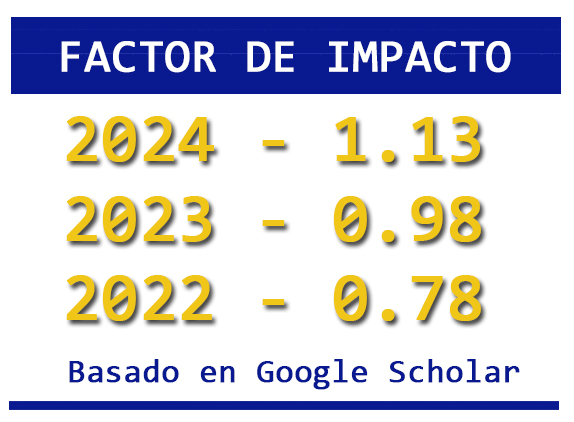Cyanide Consumption of a Gold-Bearing Pyrite Concentrate, using Ozone as a Pre-Treatment
DOI:
https://doi.org/10.36790/epistemus.v15i31.194Keywords:
Gold-bearing pyrite, refractory ores, cyanidation, ozoneAbstract
Pyrite (FeS2), is the second most common host mineral for gold species. This association presents a great complexity, due to the gold can be finely disseminated or included at very fine size (0.1 to 1.0 µm), which requires extreme crushing conditions and strong oxidation in order to, liberate the gold, in a subsequent cyanidation step. In this work, cyanide consumption was evaluated, when a gold-bearing pyrite concentrate is submitted to a pretreatment with ozone prior to the conventional cyanidation. Tests were carried out at two different cyanide concentrations (1000 and 3000 ppm of CN)-, for a gold pyrite concentrate (67.44% of FeS2), where a significant decrease in cyanide consumption of 54% and 69% was found, when the mineral is submitted to an ozone treatment before cyanidation. These findings suggest that the use of ozone increases silver recovery and generates significant environmental impact.
Downloads
References
SGM, Anuario Estadístico de la Minería Mexicana Ampliado 2019, Servicio Geológico Mexicano (SGM), 2020.
Bustos R., H., Oyola L., D., Rojas M., A., Pérez A., G. A., Balogh, A. G. (2011). Cuantificación de oro refractario en granos de pirita y arsenopirita de la mina de oro “El Diamante” en Nariño - Colombia. Revista Tumbaga, 6, 153-164.
Habashi, F. (2006). Pyrite: The Strategic Mineral That became an industrial Nuisance. De re Metallica, 6 (7), 43-58.
Arias-Arce V., Coronado-Falcon, R., Puentes-Santibáñez, L., Lovera-Dávila, D. (2005). Refractariedad de concentrados auríferos. Revista del Instituto de Investigación, 8(16), 5-14. https://doi.org/10.15381/iigeo.v8i16.493
Coronado, J. H., Encinas, M. A., Leyva, J. C., Valenzuela, J. L., Valenzuela, A., Minive, G. T. (2012). Tostación de un concentrado de refractario de oro y plata. Revista de Metalurgia., 48(3), 165-174. https://doi.org/10.3989/revmetalm.1102 DOI: https://doi.org/10.3989/revmetalm.1102
Iglesias, N., Carranza, F., Palencia, P., (1997). La biolixiviación como pretratamiento de menas auríferas refractarias en matriz de sulfuros. Revista de Metalurgia, 34 (1), 29-38. https://doi.org/10.3989/revmetalm.1998.v34.i1.656 DOI: https://doi.org/10.3989/revmetalm.1998.v34.i1.656
Gavino, J. P. (2018). Tratamiento por flotación y cianuración de minerales auríferos con presencia de pirita para la concentración y extracción de oro y plata a nivel experimental (tesis de pregrado). Facultad de Ingeniería Química y Metalúrgica., Huacho, Perú.
Flatt, J.R, Wood, R. (1995). A voltametric investigation of the oxidation of pyrite in nitric acid solutions: relation to treatment of refractory gold ores. Journal of applied electrochemistry, 25, 882-856. https://doi.org/10.1007/BF00233904 DOI: https://doi.org/10.1007/BF00772204
Morera, J. (2004). Lixiviación de metales con ozono acuoso. Cinética de la plata y el oro: aplicaciones (tesis de pregrado). Universidad de Barcelona, España.
Uribe, A. S. (2002). Precipitación química de metales de sus soluciones. U. S. Centro de Investigación y de Estudios Avanzados. Guanajuato, Guanajuato: 1-15.
Downloads
Published
How to Cite
Issue
Section
License
Copyright (c) 2022 EPISTEMUS

This work is licensed under a Creative Commons Attribution-NonCommercial-NoDerivatives 4.0 International License.
The magazine acquires the patrimonial rights of the articles only for diffusion without any purpose of profit, without diminishing the own rights of authorship.
The authors are the legitimate owners of the intellectual property rights of their respective articles, and in such quality, by sending their texts they express their desire to collaborate with the Epistemus Magazine, published biannually by the University of Sonora.
Therefore, freely, voluntarily and free of charge, once accepted the article for publication, they give their rights to the University of Sonora for the University of Sonora to edit, publish, distribute and make available through intranets, Internet or CD said work, without any limitation of form or time, as long as it is non-profit and with the express obligation to respect and mention the credit that corresponds to the authors in any use that is made of it.
It is understood that this authorization is not an assignment or transmission of any of your economic rights in favor of the said institution. The University of Sonora guarantees the right to reproduce the contribution by any means in which you are the author, subject to the credit being granted corresponding to the original publication of the contribution in Epistemus.
Unless otherwise indicated, all the contents of the electronic edition are distributed under a license for use and Creative Commons — Attribution-NonCommercial-ShareAlike 4.0 International — (CC BY-NC-SA 4.0) You can consult here the informative version and the legal text of the license. This circumstance must be expressly stated in this way when necessary.
The names and email addresses entered in this journal will be used exclusively for the purposes established in it and will not be provided to third parties or for their use for other purposes.
























